
City Council January 21 Agenda
Once again, Parks and Recreation Director Joe Simonson led off the discussion during the study session with a warning, suggesting that there are only three viable options councilmembers have in dealing with the golf course: simply sell it, lease the course, or sell off the land for development and liquidate all assets.
Simonson reiterated the need to do something in regards to the course, citing the absence of an asset-replacement fund to replace golf course resources and the need to pay off a $3.5 million debt. City officials, last year, paid off part of the debt with a loan from the city’s reserve fund. He said doing nothing in regards to the course simply is not an option the city can afford, he said.
“To lease the golf course is still an option,” he said.
In fact, the city does have an offer to lease from Rich Rhoads who currently manages the course through his company Rhoads Golf. However, the city seemed to pour cold water on the proposal. In late December, Rhoads met with City Manager Jeff Laws to discuss Rhoads’s proposal and Laws presented the longtime course manager with a termination notice, which made it clear that despite whatever happens with the golf course, a sale or lease, Rhoads Golf will be terminated.
In a surprising lease offer from the city, city councilmembers suggested that a lease include a $1 million up-front payment as well as monthly payments, which over the course of 30 years add up to about $6 million dollars.
Rhoads said his lease arrangement would pay off the course by 2030, paying $200,000 per year and keep the course in public hands.
The only other offer is a $5 million deal from Lemoore’s Tachi Yokut tribe, which owns and operates the casino and hotel near Lemoore. The Tachi want to pay off the course in three installments including a $2 million payment at the end of the 14-year term.
The limited options didn’t set well with many residents who have, over the course of several weeks, again and again displayed their angst over the council’s threat to sell the course, a long-standing institution, in the City of Lemoore.
“Decisions have not been made,” said Mayor Billy Siegel. “We haven’t got there yet. We need to do what is best for the entire community of Lemoore.”
Siegel repeatedly said he would prefer a lease arrangement, but often warned that other services such as fire and police cannot be cut to help fund the course.
“Lemoore wants a golf course. That has come out of these meetings,” he said, referring to the several public hearings held in the last two months. He also seemed to warn the audience that if the city doesn’t do something to curb golf course costs, there may not even be a golf course in Lemoore’s future. “You have a less chance of playing golf there in five years if we own it,” he said.
Lemoore’s Riley Jones told councilmembers that a golf course improves the city’s quality of life. “It provides a quality of life which includes recreational opportunities,” he said. “A golf course offers opportunities for many people, including those outside of the city,” citing the Navy and surrounding communities.
“To sell the golf course for development would be a tragedy,” he continued. “Selling it to an outside interest has a lot of unknowns,” he concluded.
Resident Jane Dart, who earlier in the evening presented Siegel with a recall notice, castigated the mayor. “Since Mayor Siegel has been here, this city has been in a turmoil,” she said. “A majority of the city employees are unhappy. This is not a way to run this city.”
Dick Jacques, a local real estate broker, took exception to the city’s lease offer. “I have never seen a lease like this in my life,” referring to the city’s lease which suggests $1 million up front just to lease the course. Jacques suggested that the course will end up paying for itself because the city is destined to grow and more people will play golf.
“The only way that a lease would make sense … is if it was a lease to purchase,” he said.
“We sort of think the city is throwing us under the bus right now,” said Karen Osterland, a frequent critic of the council’s attempt to sell the golf course. “We don’t see the crisis you see,” referring to on-time payments made over the last two years and suggesting city officials haven’t always been honest about the golf course.
“We don’t feel the city is above board, and we’re angry, real angry.”
Osterland took exception to recent council statements regarding the golf course as surplus land, which if in fact the city categorized it as, would lead to a lower threshold to vote, requiring just three votes instead of four.
“Our golf course for the past 60 years has been surplus, really?”
She also cited earlier statements that the Tachi could at some point petition the Bureau of Indian Affairs to place the golf course property in trust, thus negating any contracts it may have with the city.
James Snead, the tribe’s chief financial officer suggested that it may not be that easy to accomplish, but didn’t rule it out. He said that placing property in trust, which isn’t adjacent to existing Tachi land, is “a long and arduous process. It is very close to impossible,” he said.